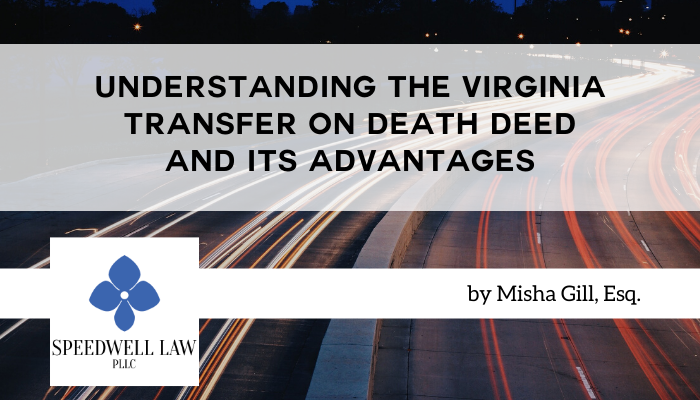
Understanding the Virginia Transfer on Death Deed and Its Advantages
Virginia law allows a person to transfer their ownership rights to real property located in Virginia to a named beneficiary or beneficiaries without it having to be probated. This is done by using a document called a Virginia transfer on death deed (TODD).
A TODD can only be used for real property and not personal property, such as cars or jewelry. That said, a TODD can be a simple and very cost-effective way to give real property, such as your house or land, to someone when you die.
What Is A Transfer On Death Deed in Virginia?
A transfer on death deed is a type of deed that identifies one or more beneficiaries who should inherit real estate at the owner’s death. For many homeowners, this can be an inexpensive estate planning tool.
A TODD functions like a beneficiary designation for real estate. And like beneficiary designations for other types of assets, a TODD avoids probate by automatically establishing who should inherit the property when the current owner dies.
There are other ways real estate in Virginia can avoid probate proceedings, including joint tenancy, tenancy by the entirety, or having the property owned by a living trust, or in the right circumstances, simply having a Last Will and Testament suffices in Virginia. But a TODD can be a great option for both individuals and joint property owners for whom a trust or other means of probate avoidance may not make sense.
Advantages of a Transfer on Death Deed in Virginia
Probate Avoidance
In Virginia, a TODD allows ownership of your real estate to be transferred to a named beneficiary upon your death, while avoiding probate. Probate can significantly delay the transfer of your property to your loved ones after your death, and can be very expensive for your estate.
Revocability
Like other types of beneficiary designations, a TODD is also revocable. So, if you create a TODD, then change your mind about it, you can easily make a change by filing a new TODD, or by revoking the TODD you filed and recording a subsequent deed to take effect.
Control
A TODD does not take effect until you die. So, if you create a TODD today, you retain total control over your property while you are alive. For example, you can still sell your house or get a loan with your house as collateral. Furthermore, you can still use a TODD if you have a mortgage or lien on the property, but your beneficiary will be given the property along with those debts when you die.
Multiple Beneficiaries
Passing ownership of your real estate to multiple beneficiaries after you die may be better served by using a trust to convey your property. But, a transfer on death deed can name multiple beneficiaries as well, and is a lot less complicated and expensive to set up than a trust.
Creating a Transfer on Death Deed
To be valid, a transfer on death deed must follow the form prescribed by Virginia law. This means, among other things, that it must be dated, signed by the property owner, and notarized.
In addition, a TODD must be recorded in the land records of the clerk’s office of the circuit court where the real estate is located. A transfer on death deed can only be filed before your death, and it only becomes effective after it is recorded with the county clerk’s office where the property is located.
Transfer on Death Deed FAQs
Can I still use a TODD if I have a Will?
Yes. But, if you also have a Will, a TODD will supersede the provision of your will related to the specific real property. This means whoever you name in the TODD will receive your property after you die, not the person named in your Will.
Who can I name as a beneficiary on my Virginia transfer on death deed?
A person filing a TODD in Virginia can name whomever they want as a beneficiary. They can also name multiple beneficiaries and alternates. The beneficiary does not have to sign the deed, nor does he or she even have to be notified.
Can I revoke or cancel my Virginia transfer on death deed?
Yes. To cancel a Virginia transfer on death deed, a revocation of transfer on death deed needs to be filed prior to your death. Cancellation will only affect your share of the property if there are other owners.
How does my TODD beneficiary get ownership of my property after my death?
After you die, the beneficiary named on your TODD should file an affidavit with the county clerk’s office where the deed is filed. Later, if the beneficiary would like to sell the property or take out a loan, he or she may need to provide proof of your death, such as a death certificate, to the title company.
Consult with an Experienced Virginia Estate Planning and Probate Attorney
Keep in mind that everyone’s estate is different. So, an estate planning strategy or tool that works well for one person’s estate may not be the best option for another.
For more information, or to find out if a Virginia transfer on death deed might be a good fit for your estate plan, call our law firm at (703) 553-2577 or use the contact form to arrange a consultation with a knowledgeable and experienced Virginia probate and estate planning attorney.
The information on this site is for general informational purposes only. The information presented in this site is not legal advice or a legal opinion. You should seek the advice of legal counsel of your choice before acting upon any of the information in this site.





